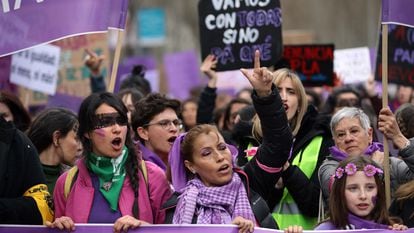Spain’s regions reach preliminary agreement to restrict travel over Easter week
In a bid to halt the spread of the coronavirus, perimetral lockdowns of territories will be maintained, a curfew will be set between 10pm and 6am and all large events will be suspended

/cloudfront-eu-central-1.images.arcpublishing.com/prisa/VQ53P7OD7VBHFO4PNF6ZXOLVCM.jpg)
Spain’s regions and the central Health Ministry on Thursday decided to extend the current coronavirus restrictions on social activity over Easter week. The preliminary agreement was reached by the Public Health commission, which brings together health officials from the central and regional governments, who are in charge of their own healthcare systems as well as managing the pandemic in their territories.
Under the pact, regions will remain under a perimetral lockdown, meaning no one can enter or leave without a justified reason, such as to go to work. This measure is already in force in all of Spain’s 17 regions, with the exception of Madrid, the Balearic Islands and the Canary Islands.
If we ease the restrictions, we could have a spike and that would endanger the recovery of the second half of the yearAlberto Infante, professor at Carlos III Health Institute
The regions also agreed to set a curfew between 10pm and 6am during Easter week and to ban large events where crowds form, meaning Spain’s world-famous Easter processions are likely to be canceled. Other measures include a four-person limit on social gatherings in both private and public spaces, regardless of whether they take place indoors or outdoors, and recommendations against members of different households gathering inside the home or other indoor spaces. The preliminary agreement must be ratified next week by the Inter-Territorial Council of the National Health System (CISNS), which is formed by the central Health Ministry and Spain’s regions.
The decision to maintain the restriction on social activity is due to the instability of the epidemiological situation in Spain: while the curve is on a downward trend, transmission levels remain dangerously high. According to the Health Ministry report released on Thursday, the 14-day cumulative number of cases per 100,000 inhabitants now stands at 153.
Speaking about the agreement at a press conference on Thursday, Spain’s secretary of state for health, Silvia Calzón, said: “An important level of consensus has been achieved.” One of the points the Health Ministry and regions agreed to was “not to lower the level of alert the regions are in two weeks prior to Easter, even if the indicators are favorable, and consequently, maintain the measures established at that point in time.”
The only region to oppose the measures was Madrid, which has the highest incidence rate in Spain among the regions, with a 14-day cumulative number of cases per 100,000 inhabitants of 253 – above the threshold considered to indicate a situation of extreme risk. Only the North African cities of Melilla and Ceuta currently have worse data. “We have voted against the proposal,” said a spokesperson from the regional health department. “We do not support either a perimetral lockdown, or bringing forward the curfew from 11pm to 10pm, or reducing the number of people at sidewalk cafés from six to four.” The spokesperson added that the region did agree with the decision to recommend against meetings inside homes with members of other households, pointing out that this has been banned “for weeks” in Madrid, with some exceptions, such as people who live alone or couples who live in separate homes.
It would be a huge mistake to lift the restrictions over Easter week because that could lead to a new spike and a fourth waveDaniel López-Acuña, former World Health Organization official
“We know that not every week of the year is the same when it comes to mobility,” said Calzon. “We know from the experience of the past months how it has impacted the rise in transmission. We are at an absolutely critical moment: we are beginning to see the hope of the vaccine, but we have not achieved enough coverage and we also have the threat of other variants that may respond differently to the vaccine,” she added, in reference to the more-infectious strains detected in the United Kingdom, Brazil and South Africa. The Health Ministry also recommended against all non-essential travel, and to take note that events in closed spaces are following the rules on capacity, as outlined by the region in question.
Health experts who spoke to EL PAÍS welcomed the decision to maintain the restrictions on social activity, but urged against easing measures ahead of Easter week. “There is a lot at stake to risk another setback,” said Alberto Infante, professor at the Carlos III Health Institute. “The epidemiological situation has improved, but we are far from levels where we can relax. If we ease the restrictions, we could have a spike and that would endanger the recovery of the second half of the year.”
Daniel López-Acuña, a former official of the World Health Organization (WHO), agreed: “It would be a huge mistake to lift the restrictions over Easter week because that could lead to a new spike and a fourth wave. The minimum we can do is to maintain the perimetral lockdown and curfew, but the restrictions in closed spaces must also be rigorously met.”
Women’s Day marches banned in Madrid

With reporting by Isabel Valdés, Pilar Álvarez and Emilio Sánchez Hidalgo.
English version by Melissa Kitson.
/cloudfront-eu-central-1.images.arcpublishing.com/prisa/LNQOU5RHYT4DQ2I6KSBXZNT5LE.JPG)
/cloudfront-eu-central-1.images.arcpublishing.com/prisa/ALVA5W4QURHQXMPQDYINEEX2ZM.jpg)










































